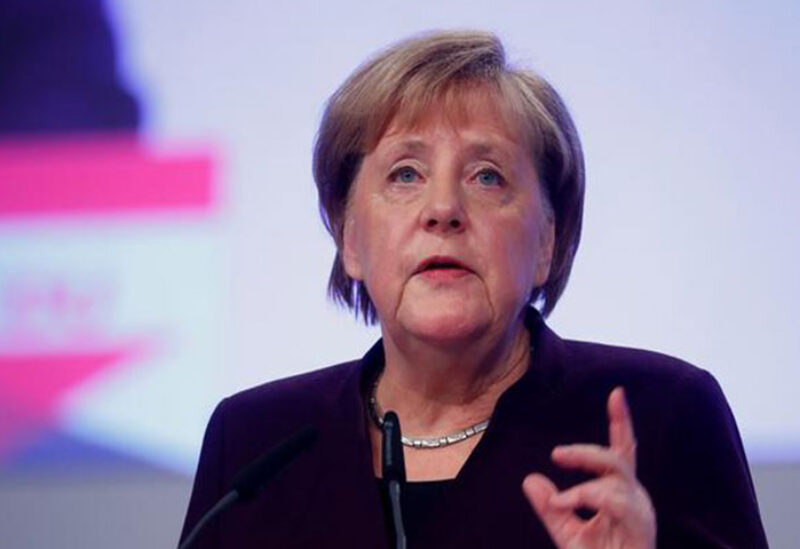
German Chancellor Angela Merkel
The Christian Democrats (CDU) party of German Chancellor Angela Merkel has won the vote in a key state, giving the conservatives a big boost ahead of the national election.
While elections in Germany’s 16 states are often influenced by local issues and voting sentiments, they are also seen as important bellwethers for the national mood.
A strong win for the CDU would be seen as a sign that Laschet, the party’s new leader, can hope for support from both conservatives and centrists on September 26, when it aims to hold onto power at the federal level despite four-term chancellor Merkel not running again.
Meanwhile, the election result, if projections based on partial counts are confirmed, would be a strong endorsement for Haseloff, who now has the comfort of being able to pick from three possible coalitions with smaller parties.
The 67-year-old, whose popularity in the state was a strong pull for voters, ruled out any cooperation with AfD or the ex-communist Left party, who were projected to get 10.9 percent of the vote – a record low in the state.
The centre-left Social Democrats, junior partners in Merkel’s ruling coalition, also fared worse than five years ago and were expected to get about 8.4 percent, while the environmentalist Greens made modest gains to take 6.2 percent.
For Greens leader Annalena Baerbock the CDU’s success was down to voters seeking to block out the AfD. Many people had voted for the CDU because they “did not want right-wing extremists in the government”, she said.
She admitted however that the Greens’ showing was poorer than hoped, as she blamed the “specific” electoral landscape in Saxony-Anhalt for the performance.
The Greens are traditionally weaker in less urban eastern Germany, which is more reliant on the carbon-intensive industries that the Greens hope to phase out.
Projections also showed that the pro-business Free Democrats entered the state assembly again after missing out five years ago, receiving 6.5 percent.
Election results in Saxony-Anhalt in eastern Germany showed CDU won around 37 percent of the votes on Sunday in the last regional poll before the general elections scheduled for September 26.
The result is a huge boost for the conservative party which has chosen its new leader Armin Laschet to replace Merkel as chancellor after her 16-year-stint at the helm.
Laschet, a centrist, was seen as having made an uncertain start to his election campaign and had faced calls to chart a more right-wing course to win back voters disenchanted by 16 years of compromises under Merkel.
“We have won the election,” Saxony-Anhalt state premier Reiner Haseloff said after the exit polls came out. “A great majority of our citizens have said we don’t want to be associated with the AfD. And for that I’m grateful.”
He and other conservatives hailed the result as a tailwind for them ahead of the federal election.
“This will give us a boost for Berlin,” national conservative caucus leader Ralph Brinkhaus said. “It is a victory for Armin Laschet.”
The AfD has moved steadily further to the right in recent years and its chapter in Saxony-Anhalt has come under increased scrutiny from Germany’s domestic intelligence service for its ties to extremist groups.
While elections in Germany’s 16 states are often influenced by local issues and voting sentiments, they are also seen as important bellwethers for the national mood.
A strong win for the CDU would be seen as a sign that Laschet, the party’s new leader, can hope for support from both conservatives and centrists on September 26, when it aims to hold onto power at the federal level despite four-term chancellor Merkel not running again.
Meanwhile, the election result, if projections based on partial counts are confirmed, would be a strong endorsement for Haseloff, who now has the comfort of being able to pick from three possible coalitions with smaller parties.
The 67-year-old, whose popularity in the state was a strong pull for voters, ruled out any cooperation with AfD or the ex-communist Left party, who were projected to get 10.9 percent of the vote – a record low in the state.
The centre-left Social Democrats, junior partners in Merkel’s ruling coalition, also fared worse than five years ago and were expected to get about 8.4 percent, while the environmentalist Greens made modest gains to take 6.2 percent.
For Greens leader Annalena Baerbock the CDU’s success was down to voters seeking to block out the AfD. Many people had voted for the CDU because they “did not want right-wing extremists in the government”, she said.
She admitted however that the Greens’ showing was poorer than hoped, as she blamed the “specific” electoral landscape in Saxony-Anhalt for the performance.
The Greens are traditionally weaker in less urban eastern Germany, which is more reliant on the carbon-intensive industries that the Greens hope to phase out.
Projections also showed that the pro-business Free Democrats entered the state assembly again after missing out five years ago, receiving 6.5 percent.